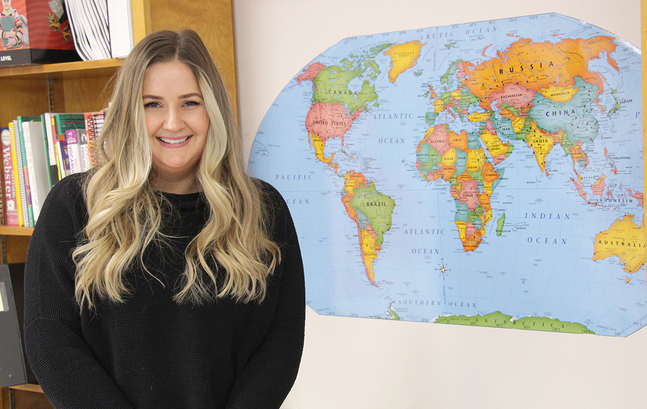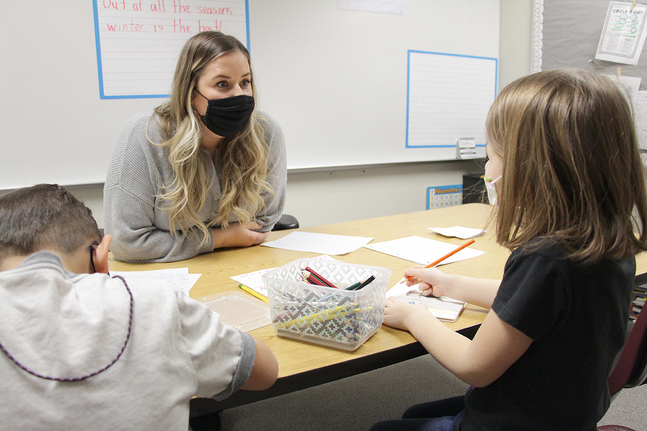Johnson is Delano Teacher of the Year
Posted on: Mar 2, 2022
Nothing is more foundational to learning than the ability to communicate, so it is fitting that English Language Learner instructor Ashley Johnson has been named Teacher of the Year for Delano Public Schools.
Johnson serves roughly 40 students from kindergarten through high school, spending time at all three schools on a regular basis. Her students come from a variety of backgrounds and speak Russian, Bulgarian, Chinese, Spanish, Hmong, French and Thai.
“Ashley continually looks for ways to support her students,” said a nomination submitted by DHS language arts teacher Rachel Holmes. “She works to provide her students with skills that will help them beyond the school walls. She manages a variety of skill levels and accommodates to the ever-changing schedule of adding new students. She is such a valuable asset to our district and our students.”
Each year a handful of teachers are nominated, and the entire district teaching staff votes on a winner. Johnson said the recognition was such a surprise that she felt it must have been a mistake when she learned she had been nominated, and her selection as the finalist was even more surreal.
“I feel very humbled, but also undeserving because of everyone else who should be getting it,” she said. “With how difficult things have been in the last three years, this feels like a reward that every teacher deserves. I’m the lucky one. I feel so lucky to work with a staff that is so dedicated to their profession and to my students and my program. I just want them to know how grateful and thankful I am, because they’re part of why I love my job.”
Foundation
The seeds of Johnson’s career were planted during her high school years in Buffalo when she volunteered to tutor a student from Africa. She enjoyed the process so much that she began mentoring in the English Language Learner (ELL) program as a senior.
“I became very close with some of the students. Some were new to country, some had been in the program for three or four years and had acquired more English skills. I just really loved it,” said Johnson. “I felt I had a passion for that. I’ve always loved languages. I took French all through high school and took Spanish and just loved learning about new cultures and people and where they were from.”
After high school Johnson attended St. Cloud State University, intending to pursue a career as a French teacher.
“I didn’t realize at the time that you could become an ELL teacher – that there was an actual license for that specifically,” said Johnson.
When she found out, however, she did not hesitate to shift majors. The pathway involved obtaining a degree in English with a concentration in linguistics and a minor in second language acquisition.
So great was the need for English language services that Johnson actually returned to Buffalo before her graduation to work part-time while finishing up her degree. After she graduated, Delano was her first opportunity for full-time employment.
“EL programs look a lot different depending on where you are,” Johnson said. “I knew I liked being in a community and school that was big enough to allow opportunities for my students, to provide what was necessary to be successful with my program, but was also small enough where you feel like you’re part of a family. Because I have a smaller population of students I am incredibly close with them. The relationship I’m able to have with each one is truly unique and individual because of how much time I can spend with them, and how they stay with me as they move through our buildings.”
Since beginning her career, Johnson has also obtained a master’s degree from Concordia University in St. Paul.
Forging connections
Although one might not think of Delano as an international destination, it has become home to many nationalities.
“There is a wide variety,” said Johnson. “That’s something that continues to surprise me since we’re a small town, but their families come from all over.”
How does she go about connecting with students who speak languages she doesn’t know?
“We use Google translate if we need to, but I try my hardest to learn something in their language to make that connection with them, because it makes a huge difference,” Johnson said. “I try to communicate with them in their language of understanding. I think that builds rapport.”
Non-verbal communication is also key to establishing a friendly and welcoming atmosphere.
“You have to make it fun for them, because they might be in a position where they understand 10-15% of what I’m saying, but if I use different body language and facial expressions to make things understood, it really helps,” said Johnson. “I have a ton of fun with my newcomers. Those are some of my most challenging days, but also some of the most rewarding.”
Good relationships are essential to enabling progress when students find themselves in unfamiliar surroundings.
“A lot of students come from situations where classrooms were not white walls with posters. It was different, or maybe they didn’t go to school, or school was outside,” said Johnson. “In order to learn language you need to be able to take risks, and to take risks you need to be comfortable. I’ve had students who are very anxious and don’t feel comfortable doing that right away, and that makes it very difficult to learn English. I just make sure my classroom is a very welcoming and open space, and a space where they can take language risks and start the language acquisition process to be proficient in English.”
From the point when those initial connections are made, English instruction commences with the basics of the alphabet, letter sounds, vocabulary and conversational English. Although there are a many variables in how quickly a student progresses, a typical timeline for new students to fully acquire English proficiency is five to seven years.
“You start with some of those things that almost seem like kindergarten basics and go from there,” said Johnson. “At the end of the day I just want to make sure I fulfill all the needs of my students. Whether that’s academic, linguistic, social-emotional or any other need they may have, I just want to make sure that I am there for them.”
Broader learning
English language learners spend more or less time with Johnson depending on their needs, but they also participate in many other classes with accommodations that Johnson establishes with their regular education teachers. When she is not directly engaged with students herself, she is often providing support to other teachers who have English language learners in their classroom.
“A lot of my students come to Delano and they’re smart. In their native language they do well in school, so it’s just the language that needs to be modified,” said Johnson. “So it’s important to reframe our thinking to say that EL is enrichment, not intervention. Modifying for language takes time and can be difficult, but when we focus on that we can really see them do well and succeed.”
World traveler
When she isn’t in the classroom, Johnson’s affinity for unfamiliar cultures naturally leads to a lot of travel.
“If I could spend every weekend on an airplane to somewhere new and uncomfortable for me, pushing myself, that would be my dream,” she said with a laugh.
Some of her favorite trips have been to South Africa, Croatia and Egypt. In addition to travel on her personal time, Johnson has led spring break trips for Delano students to Washington, D.C., and New York. She also organizes international ventures to China or, later this year, Costa Rica.
“Every time I take a trip I learn something new about the world and I can bring it back to my students,” she said. “I’m not saying I can put myself in their shoes because I absolutely cannot. But it changes my perspective of this small town. The people out there in the world – even if you can’t speak the same language – you can still have meaningful interactions.”
And when she’s not traveling herself, Johnson said that engaging with her students and their varied backgrounds is her favorite aspect of the job.
“I’m continually learning from my kids because of the experiences they bring into my classroom, and the perspective that they give,” she said. “It has made me a better teacher, and a better person.”
Post Categories: Elementary School, High School, Intermediate School

